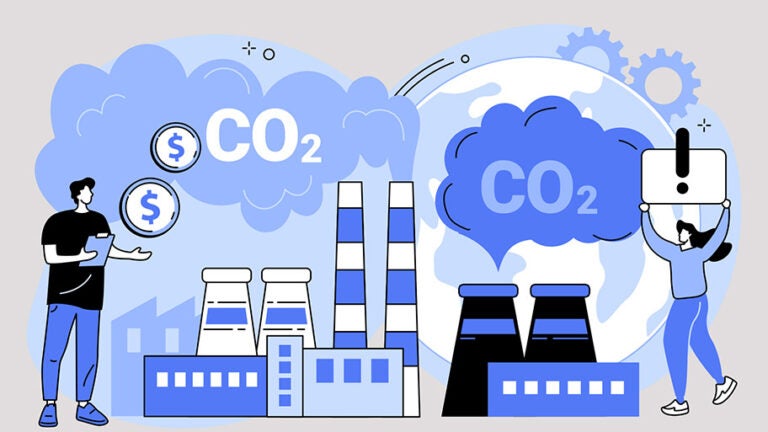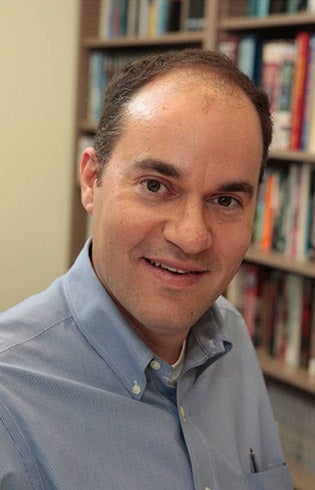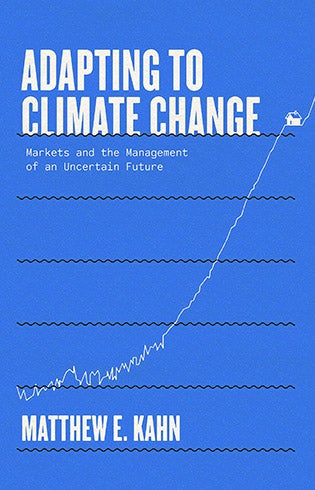
Economist Matthew Kahn says human ingenuity is key to living with climate change
Matthew Kahn is anything but sanguine when it comes to climate change. As Provost Professor of Economics and Spatial Sciences in the Department of Economics at the USC Dornsife College of Letters, Arts and Sciences, he knows it’s bad news. But as he argues in his recently published book, Adapting to Climate Change: Markets and the Management of an Uncertain Future (Yale University Press, 2021), human ingenuity, driven by free markets, will help us adapt to climate change more effectively than we might think. (Publishers Weekly named it one of its Top 10 books in business and economics for spring 2021.)
Am I right in concluding that you are an optimist by nature?

Matthew Kahn. (Photo: Courtesy of Matthew Kahn.)
I am an optimist. When I teach my USC Dornsife students economics, I speak to them about the “Time Machine” thought experiment. If each of us lives for 80 years, when would you like to live your life? Few of us would pay to take the time machine back to 1500, but would you prefer to be born in 1950 or in 2030? We differ, and this means that people will give different answers to this question.
In a recent discussion with my students, two students said that they wish they had been born in 1980 because this cohort had access to cheaper housing when they were young adults. I wish I was born in 2022. Despite the pandemic, climate change and the myriad challenges we face both domestically and in international affairs, I continue to be optimistic about quality-of-life progress. At the same time, I must acknowledge that my mother (a New York City lawyer) strongly cautions me to avoid “magical thinking”!
Is there a limit to our ability to adapt to climate change?
Back in the early 1980s, Julian Simon, an economist, and Paul Ehrlich, a biologist, debated whether there are “limits to growth.” Simon, the optimist, argued that on a planet featuring almost 8 billion people with rising human capital and access to venture finance, human ingenuity will play a central role in devising solutions to any emerging challenge that materializes. The rise of the COVID-19 vaccine is just one example.
Of course, there are limits to adaptation, and this is why I strongly support the introduction of a carbon tax that rises over time. While I support this prudent public policy, the global collective action problem is so severe that I do not believe that a credible binding treaty will be signed. Global GHG (greenhouse gas) emissions will continue to rise, and thus we must adapt. My work explores the microeconomics of the adaptation challenge. The anticipation of mass misery caused by climate change creates new opportunities for entrepreneurs and leaders who devise private sector and public sector solutions that improve our quality of life.
How do we accelerate adaptation to climate change?

Kahn’s book explores market-driven answers to climate change. (Image Source: Yale University Press.)
Leading universities play a key role here in expanding our knowledge about the actual risks we face, about how people perceive these risks and creating new knowledge that expands our coping strategies. Breakthroughs by Viterbi (USC Viterbi School of Engineering) engineers regarding enhancing our water supply represent just one example.
As young people train in new fields such as climate resilience, we will build up the skills to reduce the impacts of shocks such as the next Hurricane Ida. We are not “passive victims” here. We have strong incentives to build up our resilience in the face of Mother Nature’s stronger punches.
At USC Dornsife, an important dialogue is starting between economists and psychologists concerning climate risk perception. We will be better able to adapt to the new risks if all of us perceive them. We face greater danger if we naively underestimate the new emerging risks we face.
For those who underestimate the new climate risks related to heat, drought and fire threats, prices play a fundamental role in signaling scarcity, and rising prices induce behavioral change. We can accelerate our adaptation progress by allowing the prices of scarce water, electricity and insurance to reflect place-based risk. If California is facing greater drought, then water prices need to rise. If a geographic area such as Miami faces greater flood risk, then insurance prices there need to rise.
Can you tell us about the role of local versus federal government in spurring adaptation?
We need to change our housing zoning codes so that developers can build multi-family buildings on a given plot of land. Much of the United States is zoned for single family homes. The emerging climate science risk rating industry is now generating more geographically refined risk predictions to identify areas within cities that face less heat and flood and fire risk. In these “safe zones,” we need to change zoning codes to allow taller buildings to be built there. This will allow more people to face less climate risk in the future.
The poor face the greatest risks posed by climate change. This creates a social imperative for the federal, state and local governments to create a set of rules that helps adults and children to achieve their full potential. Reducing America’s poverty rate and strengthening our middle class will help us to adapt to climate change because richer people can afford higher quality food, shelter and products to protect themselves from emerging risks.
Recent empirical research in economics has documented the risks that climate change poses for the poor. Children learn less on hot days when they attend public schools that do not have air conditioning. Outdoor work health and productivity is directly impacted by extreme heat. Many of the victims of Hurricane Ida were poor people who lived in basements of buildings that flooded.
Is there a closing thought you’d like to convey?
Free market environmentalism is not an oxymoron! When I teach undergraduate urban economics and environmental economics, my students are surprised to encounter a passionate environmentalist who firmly believes that market competition helps to improve all of our quality of life. We respectfully debate my ideas that I present in my free textbook, Fundamentals of Environmental and Urban Economics. USC Dornsife features great undergraduates who I hire as research assistants, and several are my co-authors, including on a piece that was published in the Harvard Business Review. Everyone who knows me knows that I love to debate and that I can be convinced when I am wrong!